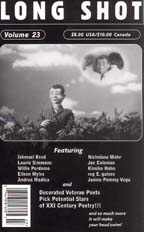On those occasions when Hoboken-based Long Shot literary magazine has no theme, or manages to survive a year when no major members of the Beat Generation die, the magazine reverts to a less conscious general theme that might well be called “the politics of the personal.” This has never been truer of any issue than the latest, released in August.
In many ways, poetry and fiction (as well as creative non-fiction) tend to provide the background music for current society, the themes and passions of every day life lived out in a way newspaper articles and television reports fail to capture.
Left to their own resources, the wordsmiths reflect upon themselves and take inspiration from the world most immediately around them, incidentally telling the larger story of what life is really like at that particular moment in time.
Although Danny Shot, the publisher, might deny it, Long Shot is an urban magazine – made very evident in this issue by works like “Urban Babylon” by Amina Munoz-Ali or “August City Swings” by Cheryl Boyce Taylor. Even when the writers don’t say it so blatantly, their poems and stories dwell on situations generally found in an urban environment.
Many artists published in this issue seem to shape their reality out of experiences largely found in big cities, with stories touching on the robbery of a black woman on her way home at night (John Rodriguez’s “Just Another Black Girl”) or an incestuous rape (Barbara Pecks’ “Seconds”).
Violence shapes its own theme in this issue of Long Shot the way it has shaped the theme of the last decade throughout the urban (and perhaps suburban) American landscape. This is not the institutional violence so amply portrayed by the Vietnam Conflict or the Cold War. This is the passionate personal violence of day-to-day living, like the urban conflict between black and cop in Willie Perdomo’s “Forty-One Bullets Off-Broadway” and Jannie Pommy Vega’s “SHU” or the more internal yet just as real violence in Sharon Olkina’s “The Cutting” and the remarkably frank world by Danny Shot himself in “Susie.”
Echoing this theme is the artwork of Joe Coleman, whose nightmare images seem to sum up in graphic detail many of the issues the poets and writers sought to create with words.
Not all doom and gloom
This issue of Long Shot is not without its political element, from the politically correct “Under House Arrest: Every Female in Afghanistan,” by Joanne Young to “Silver Lining” by Robert Press, with its haunting echoes of Post World War II Atomic annihilation.
Johnny Cordova, in “Fires,” reminds the reader that schools outside the urban setting are no longer free of violence: “Somebody stuffed a 20oz./soda bottle with toilet paper/ lit it like a fuse. At Oakland Tech/they lit three garbage cans /on fire, simultaneously,at/ different locations in the hallways.”
Long Shot, of course, is not all doom and gloom. Humorous and touching works wedge their way between the violent scenes to provide release, such as the “New Jersey Sketches” by Yuko Otomo and “Flammable Pedagogy” by Lisa Jarnot.
Mark Blickley – a former news reporter for the Bergen Record – maintained Long Shot’s longtime theme of a writer coming of age in “Bowls with Bowles.”
Sex, AIDS, personal relationships, the ’60s, and the environment also retain their traditional places in the Long Shot gallery.
Even though Long Shot draws from a talent pool that is international in scope, Hudson County is well represented by Hoboken’s Shot, Blickley and Mike Latch; Jersey City’s Jack Wiler, Irene Perez, reg E. gaines, and Lynne Breitfeller; and the Bayonne storekeeper poet, Hersch Silverman.
Allen Ginsberg helped get Long Shot off the ground in the early 1980s after Danny Shot and Eliot Katz approached him after a reading. Since then, Long Shot has managed to publish some of the biggest names in classic and contemporary poetry including Ginsberg himself, William Burroughs, Tom Waits, Anne Waldman and others. The magazine has been credited with helping to regenerate poetry in the 1990s. This issue of Long Shot has a special section in which veteran poets such as Jack Hirschman and Alicia Ostriker pick those poets they see as potential stars of the 21st century.
